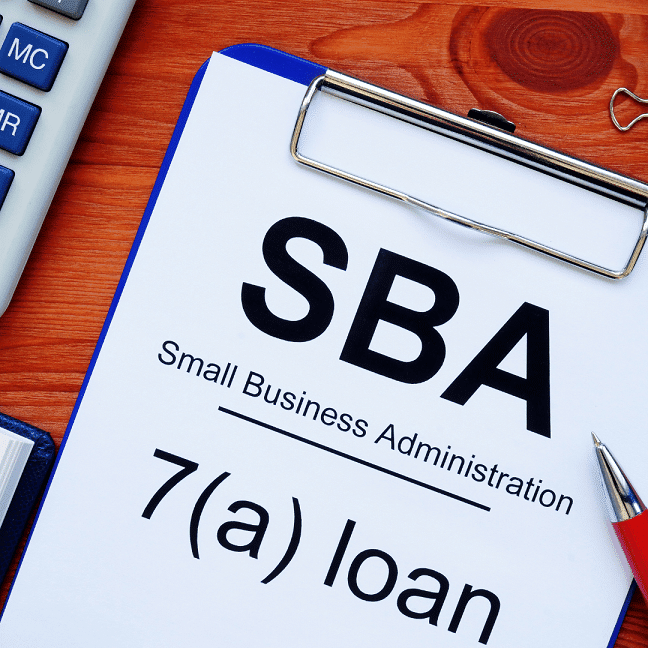Best Small Business Loans in April, 2025
Compare multiple business loan lenders and get funding best suited for your needs with our simple online application process.







Compare best business loans of 2025 from top lenders
There comes a time in every business when you’ll think about ways to raise additional funds to make your next move. It may be that you’re ready to expand to a new location, need to replace essential equipment, or ease cash flow issues in times when you’re waiting for clients to pay you. Whatever the reason, a business loan can be the perfect answer to your problems.
Applying for a business loan is fast and easy:

Get pre-qualified
Complete our simple online application. Checking rates won’t affect your credit score

Choose your loan
We will present you with personalized loan offers and help you make a decision.

Receive your funds
Complete your application and get funded from the lender of your choice.
Compare Business Loans
Find the right loan for your business by exploring the different types of financing options and comparing rates from multiple best lenders online. Whether you are startup or have business expansion needs, we'll help match you with best business loan options. Get Started..
SBA Loans
SBA loans are backed by the U.S. Small Business Administration and offer low rates and long repayment terms.
Startup Business Loans
Get funding for your brand new startup and accelerate your business growth and compare rates from multiple lenders.
Business Line of Credit
A business line of credit is a revolving loan designed to help you fund short term unexpected and large purchases.
Equipment Financing
Upgrade your equipment and gain access to working capital with equipment financing options.
Term Loans
A business term loan offers a lump sum of upfront capital, which is repaid at regular intervals at fixed interest rates.
Invoice Factoring
Invoice financing is an asset-based loan that lets you borrow money against outstanding customer invoices.
Compare Business Loan Offers
Compare the best business loan lenders
Need help finding the right loan?
No worries, we've got you covered! Compare personalized loan options in just minutes without impact on your credit score.
How Pasha Funding Works

Compare Business Loan Offers
Business loan payment calculator
Total Payment
-
Total Interest
-
Monthly Payment
-
Ready to get funded?
Compare personalized business loan rates from top lenders with no impact on your credit, ever.
What is a business loan?
A business loan is a type of financing provided by financial institutions or lenders to support the financial needs of a business. It is specifically designed to help businesses cover various expenses, such as starting a new venture, expanding operations, purchasing equipment, managing cash flow, or investing in other business-related activities.
Business loans typically come with a predetermined amount, repayment term, interest rate, and other terms and conditions. The loan amount and terms are often based on factors such as the borrower's creditworthiness, business performance, collateral (if required), and the lender's criteria.
How does a business loan work?
If you run a business, you may be able to apply for a business loan to help fund your growth. They work in the same way personal loans do for consumers – you apply for a loan with terms that meet your needs, and if approved you’ll get a lump sum in your business account within hours or days. You can then use this money to pay for any business expenses, and you’ll pay it back over a fixed term of weeks, months, or years, plus interest.
There are other types of business loans that have more flexible terms – well talk about those shortly.
What type of businesses typically get a business loan?
Almost any business can seek funding via a business loan of some kind, though it is more common for some industries than others. Some of the types of businesses that typically get a business loan are:
- Startups or new ventures looking to fund their initial operations.
- Small businesses aiming to expand their operations or enter new markets.
- Established businesses seeking to invest in new equipment or technology.
- Retail businesses in need of inventory financing to purchase goods for sale.
- Manufacturing companies requiring capital to scale their production capacity.
- Service-based businesses, such as consulting firms or marketing agencies, needing funds for business development or hiring.
- Restaurants or hospitality businesses seeking working capital or funds for renovations.
- Construction companies requiring financing for projects, equipment, or materials.
- Medical practices or healthcare facilities looking for funds to upgrade equipment or expand facilities.
- E-commerce businesses needing capital for website development, marketing, or inventory management.
- Seasonal businesses requiring funds to cover expenses during slower periods.
- Franchisees looking to open new locations or upgrade existing ones.
- Agricultural businesses requiring funds for equipment, land purchase, or crop cultivation.
- Non-profit organizations seeking funds for program development or operational expenses.
- Professional service providers, such as lawyers or accountants, needing funds for office expansion or technology upgrades.
How do you get a business loan?
To get a business loan you need to decide on the type of loan that’s right for you, compare rates and terms, and then apply via an application form. The lender will then review your application and decide whether or not they believe you are a good company to lend to. Most lenders are upfront with their requirements so you’ll have a good idea of whether you’ll be approved or not before you start the application process, and some lenders offer preapproval.
Types of small business loans
- Business term loans: this is the traditional type of loan that works in the same way as a personal loan, only the loan is to a business and can only be used for business purposes. You borrow a lump sum over a short, medium, or long-term, and pay it back each week or month in fixed monthly payments. The interest rates on these loans are generally between 5% and 30%, depending on the term and your circumstances. Bank term loans have lower rates and longer terms but are difficult to get. Loans from online lenders are easier to get and have more flexible terms but usually come with higher rates.
- SBA loans: SBA (Small Business Administration) loans are loans that are guaranteed by the government, so often come with the lowest interest rates on the market. Most of their loans are term loans with a maximum term of 10 years, but they also offer commercial real estate loans with terms up to 25 years. The downside of SBA loans is they’re hard to qualify for, and the application process is long – often taking 2 months to complete and receive funding.
- Business lines of credit: this is a type of loan where a lender agrees upon a maximum amount of credit you can use, which you are then granted access to. You can use this line of credit for anything you need, withdrawing money as and when you need to. The great thing about these types of loans is you only pay interest on the amount of money you’ve actually used, so it’s a great option if you want a flexible way to borrow or will be staggering how you spend the money. Most lines of credit also allow you to reuse credit again once you’ve paid it back, like a credit card, though some add up until you reach the total credit allowed, and then the line is closed. The downside of these types of loans is they often come with additional fees, and they are generally fairly difficult to qualify for.
- Merchant cash advance: this type of financing is for those who process card payments for the majority of their transactions. The card processor you use lends you a lump sum amount which you then pay back through a percentage of your transactions until the loan is paid back. The benefit of these loans is they rarely care about your credit score because they already know about how much money you make and how consistently you make it. Many also now offer low interest rates or a flat fee. The downside is you have little control over how much you pay back each month, so if you wanted to use that additional money for another purpose you couldn’t. That said, you can usually pay them back much faster than other loans.
- Equipment loans: equipment loans work like a car loan, in that you borrow the full value of the equipment you want to buy, and the loan is secured against the equipment you purchase. You then make monthly payments to pay off the loan and the interest. The benefit of these loans is, because they’re secured, they’re often easier to get and/or have lower rates. The downside is if you default on your payments, they’ll take the equipment back which may be catastrophic if your business relies on it.
- Invoice financing: if your business works with big companies and have invoices with net-30 or more terms, you can look into invoice factoring or invoice financing to help you manage your cash flow. This is where you borrow against the value of the invoice.
- Commercial real estate loans: this is usually a mortgage for a commercial property, so the loan amount is secured against the property and can usually only be used to pay for real estate purchases and improvements.
- Peer-to-peer lending: peer-to-peer lending is like crowdfunding, but instead of seeking funding from potential customers and supporters, you get a loan from numerous small investors. If they believe in your business, they’ll fund your loan, which you’ll then pay back with interest. Interest rates vary, though are typically higher than traditional and online lenders.
Top Small Business Loan Comparison
| Lender Name | Best Use | Maximum Financing Amount | Minimum Time in Business | Loan Term | Minimum Credit Score Required | Approval Speed |
|---|---|---|---|---|---|---|
| Kabbage | Short-term working capital, invoice financing | $250,000 | 6 months | 6 months to 12 months | 560+ | As fast as 10 minutes |
| BlueVine | Short-term working capital, invoice financing, equipment financing | $250,000 | 6 months | 6 months to 12 months | 600+ | As fast as 1 day |
| Funding Circle | Long-term equipment financing, business expansion | $500,000 | 2 years | 24 months to 60 months | 620+ | 48 hours to 2 weeks |
| Fundbox | Short-term working capital, invoice financing | $150,000 | 3 months | 12 weeks to 12 months | 575+ | As fast as 48 hours |
| Ondeck | Short-term working capital, equipment financing | $250,000 | 1 year | 6 months to 12 months | 640+ | As fast as 1 day |
Quick links

Ready to apply for a business loan & financing? Get started today.
Are there alternatives to business loans?
Yes, there are some alternatives, such as:
- Business credit cards: this is a quick and easy way to borrow, and business credit cards work the same way as personal credit cards, so you’ll likely be familiar with how to manage them. That said, they often have high-interest rates, additional fees, and aren’t often suitable for big expenses.
- Invoice factoring: this is where you essentially sell an invoice to a third-party company for a percentage of the invoice value. You are then able to walk away, as they chase the customer for payment. This is a fast way to get funding and won’t require a credit check on your part. The downside is you lose control of the customer experience, so you may find the customer is unwilling to work with your business again if the invoice factoring company isn’t good to work with.
- Crowdfunding: where you ask customers and supporters to fund your business.
- Grants: the government may offer your business grants (essentially free money) if your business is beneficial for a local community or fulfills another need.
- Overdrafts: most bank accounts will allow you to get an overdraft, which essentially allows you to become overdrawn. This is a good way to manage cash flow issues without having to seek a loan every time or use a credit card. However, they often come with high fees and interest rates, so make sure the overdraft makes financial sense for your business before you choose it as your form of funding.
What are the typical business loan rates I can expect to pay?
The interest rates for business loans can vary widely depending on several factors, including the lender, the type of loan, the borrower's creditworthiness, the loan amount, the repayment term, and prevailing market conditions.
How much does it cost to get a business loan?
The cost of a business loan can vary depending on several factors, including the lender, loan type, loan amount, repayment term, interest rate, and the borrower's creditworthiness. Here are some common costs associated with business loans:
- Interest Rate: This is the cost of borrowing the funds and is typically expressed as an annual percentage rate (APR). The interest rate can be fixed or variable. The higher the interest rate, the more expensive the loan will be over time.
- Origination Fee: Some lenders may charge an origination fee, which is a one-time fee calculated as a percentage of the loan amount. This fee covers the administrative costs of processing the loan.
- Application Fee: Certain lenders may require an application fee to cover the costs of evaluating the loan application. This fee is typically non-refundable, regardless of whether the loan is approved or not.
- Underwriting Fee: In some cases, lenders may charge an underwriting fee to cover the costs associated with assessing the borrower's creditworthiness and determining the loan terms.
- Prepayment Penalty: Some loans may have a prepayment penalty if the borrower decides to pay off the loan before the agreed-upon term. This penalty is intended to compensate the lender for potential interest income lost due to early repayment.
- Late Payment Fees: If the borrower fails to make loan payments on time, late payment fees may be charged. These fees can vary depending on the lender and the loan agreement.
How to qualify for a business loan
To qualify, make sure you fully understand how your business is doing financially and have a strong plan for what you’ll use your loan for. Check your credit score and make sure there are no errors. Once you’ve chosen the best type of business loan for you, compare loans and terms and find out what lenders require from you for that type of loan. Most will need extensive documentation, but others require very little. Take your time to gather the right information and you’ll be in the best position to qualify.
Apply for a business loan online
Once you’ve decided a business loan is right for you and you believe you’re in a strong position to secure one, it’s time to start comparing rates. Remember the interest rate will be the biggest factor in how affordable (or not) the loan is.
To apply for a business loan online:
- Research and compare lenders.
- Gather required documents.
- Determine loan amount and purpose.
- Visit the lender's website.
- Fill out the online application form.
- Upload necessary documents.
- Review and accept loan terms.
- Complete and submit the application.
- Wait for approval and funding.
Need help finding the right loan?
No worries, we've got you covered! Compare personalized loan options in just minutes without impact on your credit score.
More Business Loan FAQs
Business Loan Types
Business Expansion Loans
Business Line of Credit
Business Term Loans
Commercial Real Estate Loans
Construction Business Loans
Equipment Financing
eCommerce Business Loans
Invoice Factoring
LLC Business Loans
Long Term Business Loans
Merchant Cash Advances
Minority Business Loans
Payroll Financing
Purchase Order Financing
SBA Loans
Small Business Loans for Women
Startup Business Loans
Working Capital Loans
Industries
Agriculture Business Loans
Auto Repair Shop Business Loans
Beauty Salon Business Loans
Cannabis Business Loans
Dental Practice Business Loans
Food Truck Business Loans
Landscaping Business Loans
Law Firm Business Loans
Medical Practice Business Loans
Restaurant Business Loans
Retail Business Loans
Trucking Business Loans

Find Your Best Rate
Compare Best Business Loans
Business Loan Payoff Calculator
Business Loan Lender Reviews
Business Loans By Amount
$25,000 Business Loans
$50,000 Business Loans
$100,000 Business Loans
$250,000 Business Loans
$500,000 Business Loans
Business Loans By Credit
Business Loans for Fair Credit
Business Loans for Good Credit
Business Loans for Excellent Credit
Business Loan Types
Amazon Seller Small Business Loans
Business Expansion Loans
Business Acquisition Financing
Business Line of Credit
Business Term Loans
Commercial Real Estate Loans
Construction Business Loans
Contractor Business Loans
Convenience Store Business Loans
eCommerce Business Loans
Equipment Financing
Hospitality Financing
Heavy Equipment Financing
Invoice Factoring
LLC Business Loans
Long Term Business Loans
Merchant Cash Advances
Minority Business Loans
Payroll Financing
Purchase Order Financing
SBA Loans
Small Business Loans for Women
Startup Business Loans
Working Capital Loans
Industries
Agriculture Business Loans
Auto Repair Shop Business Loans
Bakeries & Bake Shops
Beauty Salon Business Loans
Bar Business Loans
Car Wash Businesses
Coffee Shop Financing
Chiropractic Business Loans
Cannabis Business Loans
Daycare Business Loans
Dental Practice Business Loans
Food Truck Business Loans
Franchise Business Financing
Financial Advisors
Gas Station Business Loans
Gyms & Fitness Centers
Healthcare Professionals
Landscaping Business Loans
Law Firm Business Loans
Manufacturing Industry
Medical Practice Business Loans
Pharmacy Business Funding
Photography Business Loans
Insurance Agency Business Loans
Restaurant Business Loans
Retail Business Loans
Spa Business Loans
Trucking Business Loans
*Disclaimer: PashaFunding.com does not function as a lender. The offers provided on this website are provided solely by third parties, who compensate PashaFunding.com for their inclusion. We would like to emphasize that PashaFunding.com will not contact you regarding any loan application resulting from the aforementioned offers, and we will never request financial information or any sensitive personal data via phone, email, or any other means.
REMEMBER, it is essential to exercise caution and never share any financial information or sensitive personal data over the phone or via email without independently verifying the identity of the company initiating the communication first!











